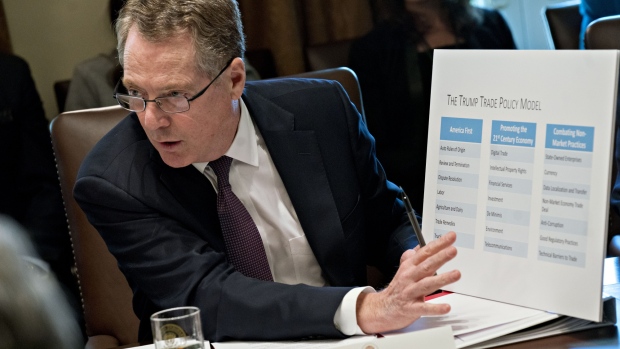Dec 9, 2018
Trump Trade Rep Tries to Insulate China Talks From Huawei Case
, Bloomberg News

(Bloomberg) -- President Donald Trump’s trade czar insisted that the U.S.’s pursuit of a Huawei executive for allegedly violating Iran sanctions was separate from trade talks with China, but warned that further criminal actions against Chinese companies were likely in the future.
Speaking on CBS’s “Face the Nation” on Sunday, Robert Lighthizer, the U.S. trade representative, also played down the possibility of extending a tariff truce between the world’s two largest economies beyond the current 90 days.
He said he considered March 1 a “hard deadline,” and warned that the U.S. would proceed with increasing tariffs on $200 billion in Chinese imports to 25 percent from 10 percent if meaningful structural changes and additional market access for U.S. exports weren’t forthcoming.
The arrest in Canada of Huawei Technologies Co. Chief Financial Officer Meng Wanzhou on Dec. 1 and a U.S. request for her extradition has provoked an angry response from Beijing, with the Chinese foreign ministry on Sunday summoning U.S. Ambassador Terry Branstad for a tongue-lashing.
It also has prompted fears that the Huawei case could trigger a collapse of the already fragile truce reached by Trump and China’s Xi Jinping at a dinner in Buenos Aires on Dec. 1.
Keep Them Separated
In a rare television appearance, Lighthizer said he considered the Huawei case and the trade talks separate matters.
“It’s my view that it should not really have much of an impact. I can understand from the Chinese perspective how they would see it that way. This is a criminal justice matter. It is totally separate from anything that I work on,’’ he said.
He also, however, warned that further cases against Chinese companies were likely as part of a broader crackdown on China’s theft of technology and other issues such as sanctions violations.
“It is certainly true that there will be continuing criminal justice matters that will go on, that will come up,’’ Lighthizer said.
Lighthizer, who’s seen as a China hawk in the Trump administration, set a high bar for a deal with Chinese officials, saying the U.S. was looking for meaningful and verifiable “structural changes’’ related to Chinese policies aimed at stealing U.S. technology.
Broken Promises
U.S. concerns over Chinese intellectual property practices went back to the administration of George H.W. Bush, he said, and China had made commitments that it had failed to live up to at least 10 times in the last six years of the Obama administration.
He also said he couldn’t reassure financial markets, which have been nervous about the possibility of a truce crumbling, that a deal would be forthcoming by a March 1 deadline.
“If there is a deal to be done we will make it. The president wants us to make a deal. But as you say, it has to be verifiable. It has to be monitored. It can’t be just big promises like we’ve seen over the last 25 years,’’ Lighthizer said.
“As far as I’m concerned it is a hard deadline. When I talk to the president of the United States he is not talking about going beyond March. He is talking about getting a deal if there is a deal to be done in the next 90 days.’’
To contact the reporter on this story: Shawn Donnan in Washington at sdonnan@bloomberg.net
To contact the editors responsible for this story: Sarah McGregor at smcgregor5@bloomberg.net, Ros Krasny, Laurie Asséo
©2018 Bloomberg L.P.